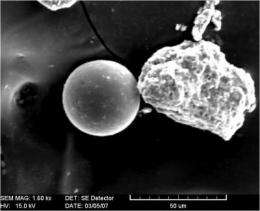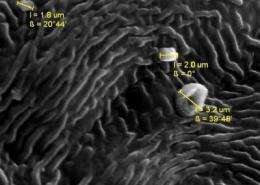Magnetic leaves reveal Bellingham's most polluted byways

Tree leaves may be powerful tools for monitoring air quality and planning biking routes and walking paths, suggests a new study by scientists at Western Washington University in Bellingham. The research will be presented at this month's Annual Meeting of the Geological Society of America in Portland, Oregon.
Leaves along bus routes were up to 10 times more magnetic than leaves on quieter streets, the study found. That magnetism comes from tiny particles of pollution -- such as iron oxides from diesel exhaust -- that float through the air and either stick to leaves or grow right into them.
Geophysicist Bernie Housen and colleague Luigi Jovane collected several leaves from 15 trees in and around Bellingham. Five of the trees lay next to busy bus routes. Five sat on parallel but much quieter side streets. Five were in a rural area nearby.
Using two measurement techniques, Housen and Jovane found that leaves along bus routes were between two and 8 times more magnetic than leaves from nearby streets and between four and 10 times more magnetic than rural leaves.
Inhaling particulate matter has been linked to a number of negative health consequences, including breathing troubles and even heart problems. Tiny particles bypass the airways and get deep into the lung tissues.

The new study suggests that biking or walking along heavy bus routes might be as bad for your health as you might suspect when choking on exhaust fumes. That's something cities might want to consider as they plan new routes for cyclists and pedestrians.
"I ride my bike to work every day," Housen said. "I've always wondered what the effects of diesel exhaust are on my health."
While many details remain to be worked out, the study also suggests that collecting tree leaves can be a simple and effective way to measure the load of particulate matter in the air. European researchers have been exploring the idea for a while, but this is one of the first studies to apply the technique in the United States.
"Using trees is a nice, low-tech way to do these studies and you don't need to use fancy particle collectors," Housen said. "If it works, you could easily collect a lot of data from a region. You could even have kids collect leaves. That makes it a powerful tool to see variation of particulate matter on a very detailed level."
More information: View research abstract at gsa.confex.com/gsa/2009AM/fina … /abstract_164610.htm
Source: Geological Society of America














